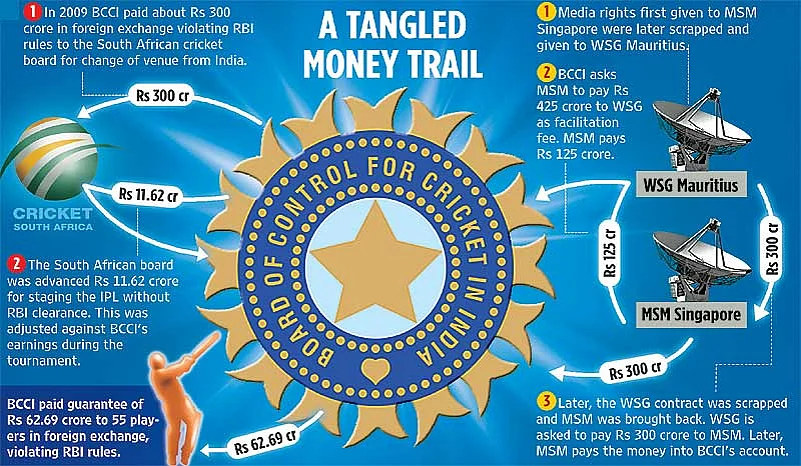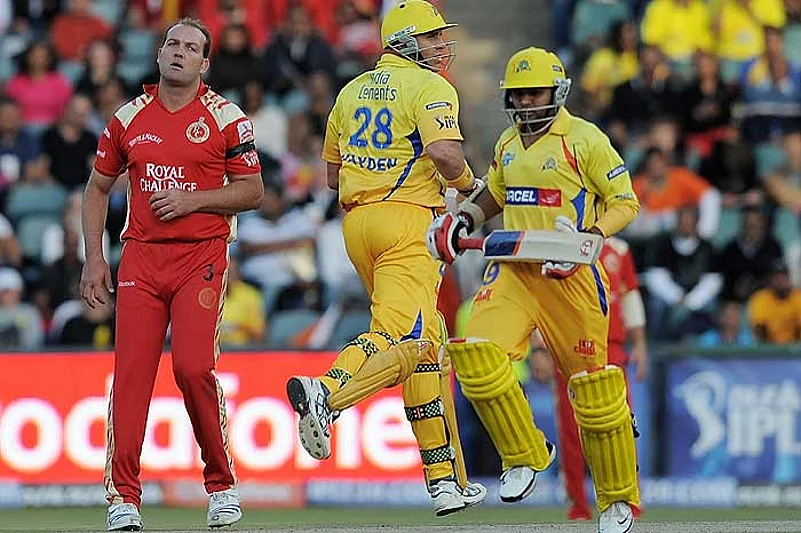The Board of Control for Cricket in India (BCCI) has caused a loss of hundreds of crores to the exchequer by violating Foreign Exchange Management Act (FEMA) regulations and through money-laundering. This has come to light following investigations by the Enforcement Directorate (ED). The investigating agency is ready with its complaint against BCCI. The ED was probing the alleged money-laundering during the IPL events organised in India and abroad by BCCI.

The violations pertain to allocation of TV rights, mobile rights, interactive service rights, exclusive coverage rights and commentary rights for the IPL matches. The ED has also found that in shifting the IPL tournament venues from India to South Africa in 2009, foreign exchange transactions “in the range of Rs 200-300 crore” were made without paying taxes mandated by RBI guidelines. The taxable amount varies from case to case and is calculated after factoring in the liabilities and holdings of the company or individual.
For the IPL-II tournament, the South African cricket board and sponsors were advanced $25,00,000 (Rs 11.62 crore) by the BCCI. According to investigators, this amount was adjusted against the BCCI’s earnings in South Africa. No tax was paid on this either. The money was brought in illegally through Mauritius and Singapore. The BCCI thus flouted Section 6 of FEMA and caused a loss of crores of rupees to the exchequer.
The advance itself was not above board. “As per FEMA, it is a violation for an Indian to give a guarantee/surety or undertake a transaction which has the effect of guaranteeing a debt, obligation or other liability owed by an Indian citizen to a person residing outside India without RBI’s permission,” says Manish Mohan, a Supreme Court lawyer. “So this is a clear case of FEMA violation.” The penalty is thrice the amount of tax that was due. The amount is yet to be tabulated.
The Mumbai wing of the ED, which investigated the BCCI, has sent a detailed update on the probe, dated July 9, 2010, to one of its Delhi-based special directors. The exclusive documents accessed by Outlook confirm the tax evasion.
Investigations also point to frequent awarding and cancellation of media rights. This was done to facilitate huge earning of foreign exchange even as FEMA regulations were overlooked. Consider what the ED report has to say on the sequence of events:
- January 21, 2008: BCCI enters into an agreement with M/s Multiscreen Media (MSM), Singapore, formerly known as Sony Entertainment Television, for media rights for the Indian subcontinent. The contract was for five years (2008-2012) with an option to extend it by another five-year term.
- March 14, 2009: BCCI unilaterally terminates the contract to MSM Singapore because of poor quality of broadcasting.
- March 15, 2009: A fresh contract is drafted and media rights are given by the BCCI to World Sports Group (WSG), Mauritius, unknown in broadcasting.
- March 25, 2009: The BCCI executes a fresh agreement with MSM Singapore.
- March 25, 2009: Another agreement is signed between MSM and WSG for Rs 425 crore. This was for assistance provided by WSG to MSM in finalise the BCCI-MSM agreement. As per the agreement, the “facilitation fee” was to be paid in US dollars by MSM, Singapore, to a designated account of WSG in Mauritius. The agreement between the BCCI, WSG and MSM contains clauses which make it binding on BCCI to ensure that MSM pays WSG the facilitation fee.
According to the ED, the payment being paid on the instructions of the BCCI amounts to “BCCI entering to a financial transaction with WSG,” a foreign company. This contravened Section 3(d) of FEMA, under which such transactions have to get RBI clearance. As things stood, MSM Singapore had already paid Rs 125 crore to WSG as facilitation fee and the remaining Rs 300 crore was yet to be paid.
- June 2010: After the ED investigations, the BCCI terminates its agreement with MSM Singapore and WSG. It signs an amended agreement with MSM Singapore, in which the media company agrees to pay the BCCI Rs 300 crore, which represents the balance of the facilitation fee that was to be paid to WSG. Tax is not paid on this amount. Neither are RBI guidelines followed.
Further, the ED in its letter number F. No-T-3/81-B/2008/PKN of July 9, 2010, written to the special director of enforcement directorate, Balesh Kumar, pointed out that the payment guarantees given by BCCI-IPL for international cricket players were in violation of Section 6(3) of FEMA. The letter notes that BCCI, in clear violation of FEMA, paid guarantees as per the BCCI-IPL MoU to hire international players. The amount, paid in dollars, amounted to Rs 62.69 crore and extended guarantees to 55 players. These guarantees were given without any RBI permission.
As per the MoU inked between BCCI, IPL and the players, a base fee was determined for each player. BCCI-IPL guaranteed to pay the base price to these foreign players irrespective of the success of the auction bid. This payment guarantee extended to the foreign players by BCCI-IPL is in violation of FEMA.
B.R. Lall, a former joint director of CBI, who had investigated the Jain hawala case and recently finished a book on the routes and gaps in the system, told Outlook: “Such dubious transactions are common. The major reason is that FEMA is a management act; prosecution is not possible under it. The earlier act, fera, had strict provisions for prosecution. I would not hesitate to say that influential lobbies have worked to convert fera into FEMA and made it toothless.”
Kirti Azad, a bjp leader and former Test cricketer, reacting to the BCCI’s involvement in tax evasion and money-laundering, had this to say: “It is very unfortunate, since the representatives of the BCCI are top people of the country. There are politicians cutting across party lines—this prevents any inquiry against them. Those who initiated an inquiry against Lalit Modi are pointing fingers when they too are part of the drama. The BCCI may act as if it has nothing to do with the IPL mess, but it is part of the muck.”
Perhaps it’s because of the high profile of the BCCI office-bearers that the ED report does not name a single official.


























